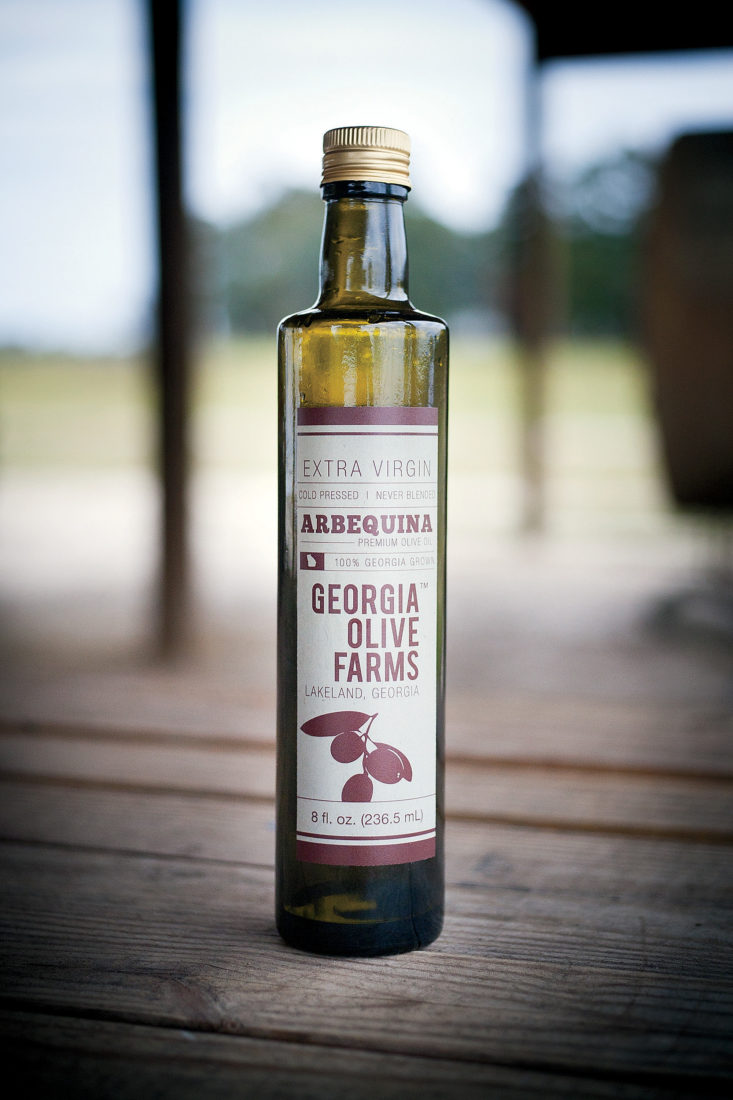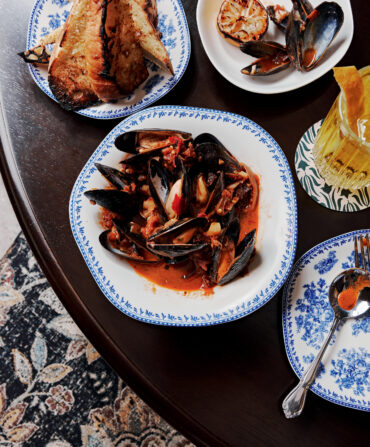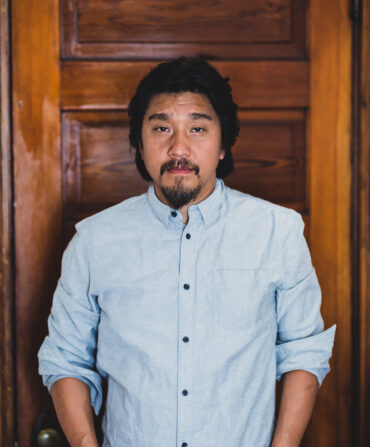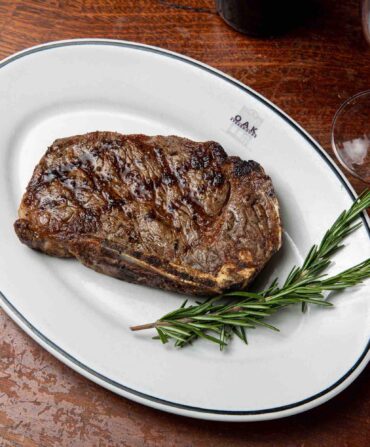Under the glassy-eyed gaze of a wall laden with stuffed turkey and deer, Jason Shaw, a recently elected Georgia state legislator, pours a bit of pale, greenish-gold oil from a dark bottle into a minuscule shot glass. “You don’t want to drink the whole thing,” Shaw says. “Just slurp it a little. Get some air in it.”
Sitting at the kitchen table of the Shaw family’s tiny hunting cabin in Lakeland, Georgia, I’m struck by the sharp contrasts of the modern South. A nearly forty-year-old man who grew up helping his granddaddy render family hogs into high-grade, artery-clogging lard is taking a dainty sommelier’s sip of olive oil, a tonic praised for both its health benefits and its delicate flavor. And this isn’t just any olive oil; it’s his olive oil. Shaw and his family have produced Georgia’s first certified extra-virgin olive oil through their Georgia Olive Farms cooperative.
Fittingly, we discover a fresh loaf of Merita on the counter, pop open a couple of Cokes, and commence swirling the soft white bread through the Shaws’ elixir. It tastes buttery, lightly fruity, and a lot fresher than anything you buy at the store. We’re joined by Jason’s father, Jay, who recently retired from Georgia’s legislature, and his ponytailed cousin, Kevin, whose weathered hands have reared the state’s first commercially grown olives in well over a century.
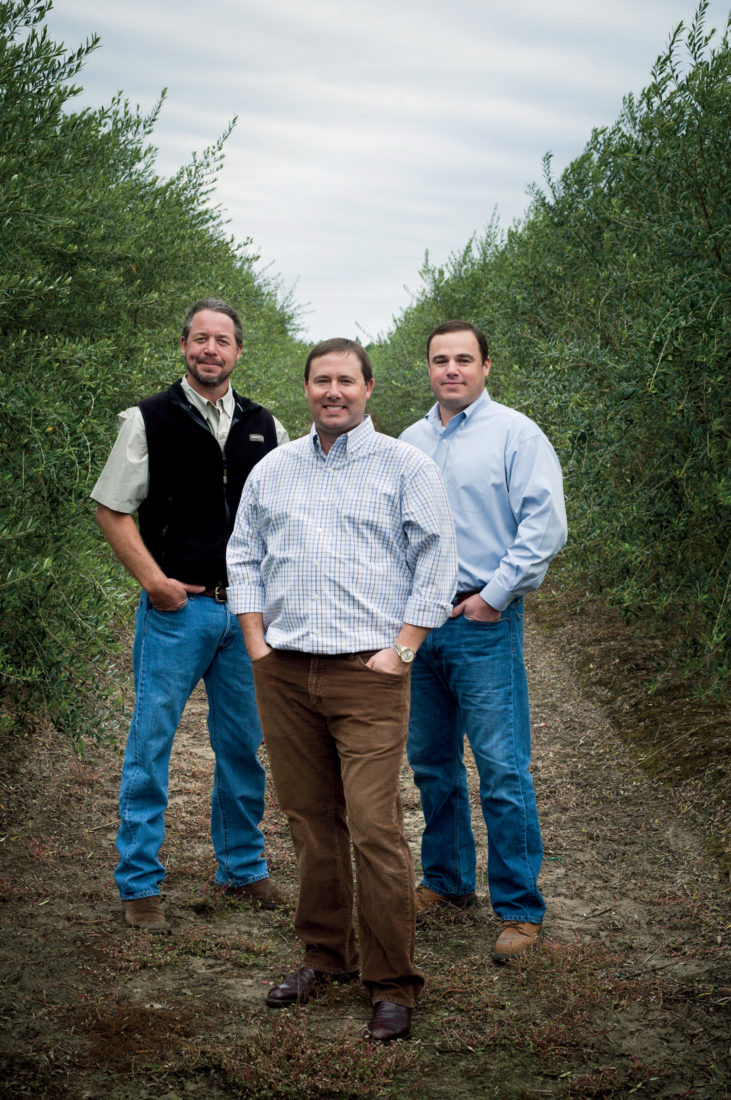
Photo: Imke Lass
Kevin, Jason, and Sam Shaw in their orchard.
During the antebellum period, olive groves dotted the Lowcountry landscape of Charleston, South Carolina, and Georgia’s St. Simons and Cumberland islands alongside peanuts, tomatoes, and corn. But labor shortages during the Civil War, the advent of cheap, easy-to-produce cottonseed oil, and a mighty hurricane left most groves abandoned or destroyed by the late 1800s.
Jason Shaw began contemplating olives as a cash crop in 1996, when a University of Georgia undergraduate study-abroad program led him to Verona, Italy. “You realize, you’d better like [olive oil] because you can’t get ranch and blue cheese over there,” he says, laughing. “So I acquired a taste for it, like wine or Scotch. Years passed but I always wondered, ‘Why can’t you grow olives in South Georgia like you can in Italy or Spain?’ It can be hot as hell and humid there just like back here.”
Eventually, Jason and his brother, Sam, made contact with Mark Hanly, a Brunswick, Georgia, doctor who had been experimenting locally with a couple of hundred olive trees, and with growers in the California wine country who were raising hardy varieties like Arbequina, Arbosana, and Koroneiki in groves some fifteen times as thick as those found on a typical European farm. In the spring of 2009, the Shaws invested in scores of saplings, supported them with wire and bamboo, and nourished them through a maze of irrigation hoses. Nearly three years later, these lush, fast-growing trees stand more than six feet tall, having survived lengthy freezes and a tornado blast.
The Shaws’ initial reserves of olive oil are bound for Southern chefs, including Athens’ Peter Dale (the National), Atlanta’s Jon Wolf (Terrace on Peachtree), and Charleston’s Sean Brock (Husk, McCrady’s), who has already planted several Shaw-provided saplings on his acreage outside Charleston. Once it appears on restaurant tables across the South, Jay Shaw reckons the oil will sell itself.
“That European stuff,” he says, pointing to a plateful of store-bought Italian olive oil while sopping a last slice of Merita in the Shaws’ brew, “doesn’t have any flavor—it’s just oil. This, I mean, there’s just no comparison. No comparison at all.”
For more information, go to georgiaolivefarms.com


